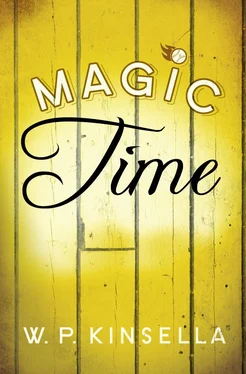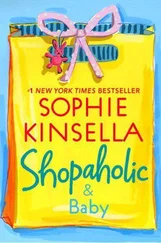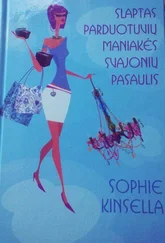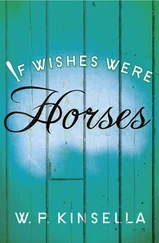About four-fifteen, just as the first blue-orange tinge appeared on the horizon, Roger returned, replaced the tools, and re-entered the house.
By game time we had sold 511 tickets. I left a woman named Margie Smood at the ticket table to sell to latecomers until the fifth inning. The concessions were booming, and the air was alive with the smell of frying onions, hot dogs, and popcorn. There was no fence around the local ball field, so, at Roger’s suggestion, Byron and I constructed a funnel-like gate, made of pickets joined by flame-orange surveyor’s tape. People were generally honest; only a few school kids and a handful of adults skirted the ticket line.
Our players were all nervous as we warmed up along first base. One thing I’d neglected to tell Roger was that our high-school team had never been able to afford uniforms – although the football team had trucks full of equipment – so we wore whatever we could scrounge: anything from jeans, T-shirts, and sneakers to a full Detroit Tigers uniform worn by Lindy Travis, who was a cousin several times removed of Detroit pitcher Virgil Trucks.
Along third, McCracken Construction, in black uniforms with gold numbers on their chests and their names in gold letters on their backs, snapped balls back and forth with authority. Baseballs smacking into gloves sounded like balloons breaking.
‘Where are the gate receipts?’ Roger asked me.
‘In a box under the ticket table. You don’t need to worry. Margie Smood’s honest.’
‘Go get them. Just leave her enough to change a twenty.’
‘But …’
‘I’ve got to get down some more bets.’
‘What if we lose?’
‘Never in doubt, Mike. Never in doubt.’
While six members of the Franklin Pierce High School Music Makers Marching Band, in beautiful red uniforms with gold buttons and epaulets, were assassinating the national anthem, Roger carried the money around to a conference with McCracken and his teammates.
The mayor, a small man with white hair and a rodent face, wearing an American Legion beret, was seated in the front row, directly behind home plate, and he had apparently agreed to hold the bets. By game time there were bags and boxes, envelopes and cartons piled at his feet. As near as I could estimate, Roger must have had upwards of ten thousand dollars riding on the game, perhaps as much as twenty thousand, most of it covered by McCracken and his team.
Roger and McCracken talked animatedly for several minutes. Finally McCracken went to his equipment bag and counted out more money; he also signed something that Roger proffered. Roger dug into the back pocket of his uniform and produced the keys to his Caddy. He held them up, let the sun play on them, then dropped them in a box with the money and the paper McCracken had signed. The box was deposited at the feet of the mayor.
McCracken appeared uncomfortable as he warmed up on the mound. One of the concessions Roger offered, even though we were playing on our home field, was to allow McCracken Construction to be home team.
McCracken pawed the dirt and stalked around the rubber. After the umpire called ‘Play Ball!’ his first three pitches were low, one bouncing right on the plate. The fourth pitch McCracken threw was a fastball, right down the heart of the plate, for a strike. I was tempted to hammer it, but held back, telling myself, a walk is as good as a single. McCracken was in trouble, I wasn’t, and he walked me with another low pitch. He walked Lindy Travis on five pitches. He walked Gussy Pulvermacher on four. As I moved to third I watched Roger whispering to our clean-up hitter, Dave Urbanski, his heavy right arm clamped on Dave’s shoulder.
The first pitch was low. The second broke in the dirt. McCracken kicked furiously at the mound. I could almost see Dave Urbanski’s confidence building as he waited. The fastball came. He drove it into the gap in left-centre for a stand-up double. Three of us scored, as Roger, leaping wildly in the third-base coach’s box, waved us in with a windmilling motion.
McCracken was rattled now. It didn’t help that the crowd was solidly behind us. Here was a high-school team coming off a two-and-nineteen season, going against a crack amateur team who were state finalists.
Our next batter walked on four pitches. Then McCracken settled in with his fastball and struck out the sixth batter, and Byron, who was seventh. The catcher hammered the first pitch about five hundred feet, nearly to the back yards of the closest housing complex. Fortunately for McCracken, the ball was foul. He reverted to his off-speed pitches and walked the catcher.
Roger Cash stepped into the batter’s box. He had confided to me that if he kept a record, his lifetime batting average would be below .100. But he looked formidable in his snow-white uniform with CASH in maroon letters and the large numbers 00 in the middle of his back. The front of his uniform had only crossed baseball bats on it. He held the bat straight up and down and waggled it purposefully.
‘Throw your fastball and I’ll put it in somebody’s back yard,’ yelled Roger, and curled his lip at McCracken.
The first pitch was a curve in the dirt, followed by a change-up low, another curve at the ankles, and something that may have been a screwball that hit two feet in front of the plate. Roger trotted to first. A fourth run scored, and the bases were still loaded.
On the first pitch to me McCracken came right down the middle with his fastball. I got part of it with the end of the bat, a dying quail just beyond the second-base man’s reach. Runs five and six scored. Lindy Travis ended the inning.
McCracken’s team tried to get all six runs back in the bottom of the first. They went out one-two-three.
I bounced around at second base, feeling as though I had insects crawling all over my body I wanted the ball to be hit to me. I dreaded the ball being hit to me.
McCracken walked the first batter in the second inning, but that was it. His curve started snapping over the plate at the last second, pitches that had been breaking into the dirt now crossed the plate as strikes at the knees.
We led 6–0 after three innings. But McCracken Construction got a run in the fourth, one in the fifth when Byron dropped a fly ball with two out, and two in the sixth with a single and a long home run by McCracken himself.
I managed to hit another Texas League single, but grounded into an inning-ending double play in the sixth.
McCracken and his team were at last catching on that Roger was little more than a journeyman pitcher with a lot of guile. He had a screwball that floated up to the plate like a powder puff, only to break in on the batter’s hands at the last instant, usually resulting in a polite pop-up to the pitcher or shortstop. His fastball was nothing, and, knowing that, he usually threw it out of the strike zone. But his change-up was a beauty, like carrying the ball to the plate. Roger’s pitching motion never changed an iota; a hitter would be finished his swing and on his way to the bench, shaking his head, by the time the ball reached the catcher.
The seventh went scoreless.
We got a run in the eighth on a double and a single, but McCracken’s team got two in the bottom, aided again by Byron’s misjudgment of a fly ball.
It was obvious that Roger was tired. His face was streaked with sweat and grime, he took off his cap after almost every pitch. To compound matters, we went out on four pitches in the top of the ninth, allowing Roger only about two minutes’ rest.
With our team leading 7–6, the first batter in the last of the ninth hit a clean single up the middle. The next sacrificed him to second. (I managed to cover first on the sacrifice – my greatest fear was that I would botch that play.) The third batter swung very late on a change-up and sent the ball like a bullet just to the inside of first. Lindy Travis lunged for the ball and, by accident, it ended up in his glove. He threw from a sitting position to Roger, covering the base, for the second out. The base runner advanced to third.
Читать дальше












